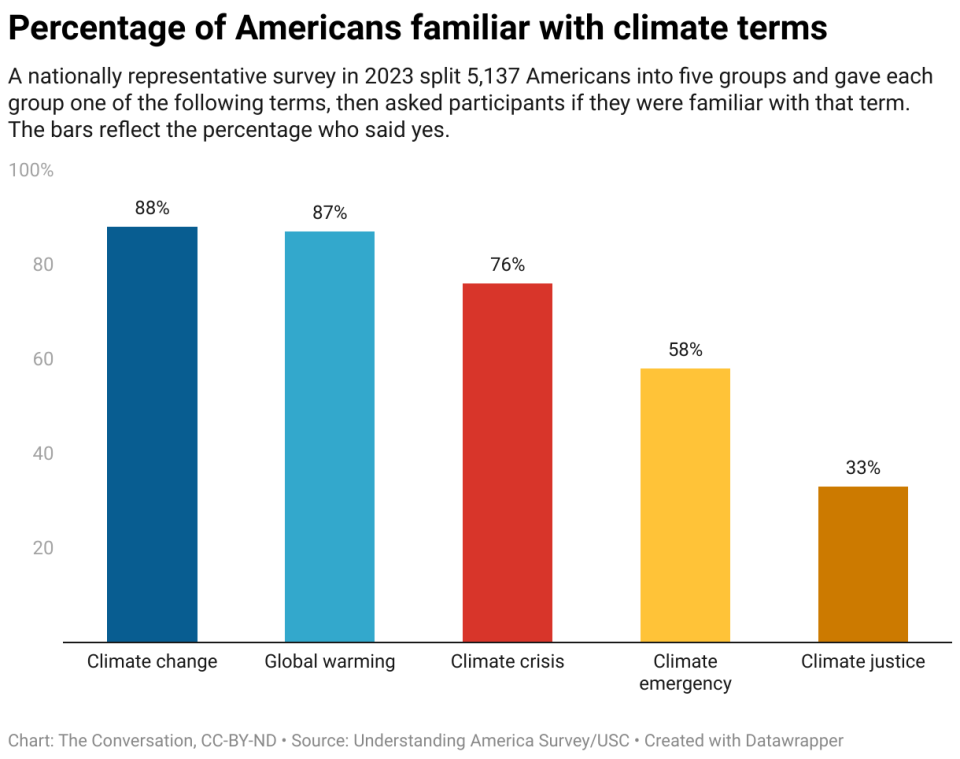You’ve probably been hearing phrases like “climate crisis,” “climate emergency,” or “climate justice” more often lately, as people try to understand the urgent risks and consequences of climate change. THE the danger is realBut is using this language really persuasive?
It turns out that Americans are more familiar with — and more concerned about — climate change and global warming than they are about the climate crisis, the climate emergency or climate justice, according to one study. recent research we conducted with a nationally representative sample of 5,137 Americans.
Furthermore, the Court found no evidence that the alternative terms increased people’s sense of urgency, willingness to support climate-friendly policies, or willingness to act.
The familiar terms – climate change and global warming – performed at least as well, and sometimes better, than climate crisis and climate emergency in terms of raising concern, perceived urgency and willingness to act. Climate justice consistently tended to have worse outcomes, probably in part because it was the least familiar. Responses were similar among Republicans, Democrats and independents.
Just keep things simple
In our work as to look for psychologistsWe explored how Americans respond to the ways climate change is communicated and discovered the need to use simple language.
For example, people we interviewed for a study published in 2021 felt that climate experts were talking over their heads with terms such as “adaptation”, “mitigation”, “sustainability” and “carbon dioxide removal”. They wanted experts to use more familiar terms.

This inspired us to write a quick guide to climate jargonpublished in The Conversation. Using everyday language makes information easier to understand, and even highly educated people tend to prefer it.
However, experts often use complex jargon because it is familiar to them and may not realize that it is unfamiliar to others.
How the Terms Evolved
It has become common to talk about climate change and global warming as if they had the same meaning, but there are differences. Climate change refers to changes in the global climate, while global warming specifically refers to rising temperatures.
ONE historical review found that in the past, people were less likely to associate the term climate change with the idea that humans are actively warming the planet than with the term global warming. Maybe that’s why Democrats used to like the term global warming, although the popularization of the term climate change has been credited to Frank Luntz, an advisor to George W. Bush administration.
Previous searches also found that Democrats tended to think of global warming as more serious than climate change, while Republicans thought of climate change as more serious than global warming. But according to a recent reviewThese partisan differences have now disappeared and most Republicans and Democrats tend to express concern about both terms.


Alternative terms such as climate crisis, climate emergency and climate justice have been used to emphasize other aspects of climate change and to try to raise concerns. In 2019, the British newspaper The Guardian he started using the climate crisis and climate emergency because he wanted to convey urgency.
Activists use the term climate justice to draw attention to climate change as a challenge to human rights: Low-income people around the world suffer more of the effects of climate change, despite being the least responsible for its cause.
Conclusion: avoid overheated language
Right now, the terms climate crisis, climate emergency or climate justice are less familiar and raise less concern than climate change or global warming.
Even if these terms become more common, there is no guarantee that they will increase concern or inspire action. In fact, studies have suggested that phrases like climate crisis could backfire if they don’t resonate with people.
Our advice: don’t make the mistake of using exaggerated language. Stick to familiar terms that people understand – use global warming when referring to rising temperatures and climate change when referring to global changes in the climate.
This article was republished from The conversationan independent, nonprofit news organization that brings you trusted facts and analysis to help you understand our complex world. It was written by: Wändi Bruine de Bruin, USC Dornsife College of Letters, Arts and Sciences and Gale Sinatra, University of Southern California
Read more:
The current study was funded by the Wrigley Institute for Environmental Studies at the University of Southern California. Wändi Bruine de Bruin was additionally supported by a grant from the Golden Belt Community Foundation and receives funding from the Lloyd’s Register Foundation, in part to inform climate change communications around the world.
Gale Sinatra receives funding from the National Science Foundation.



































